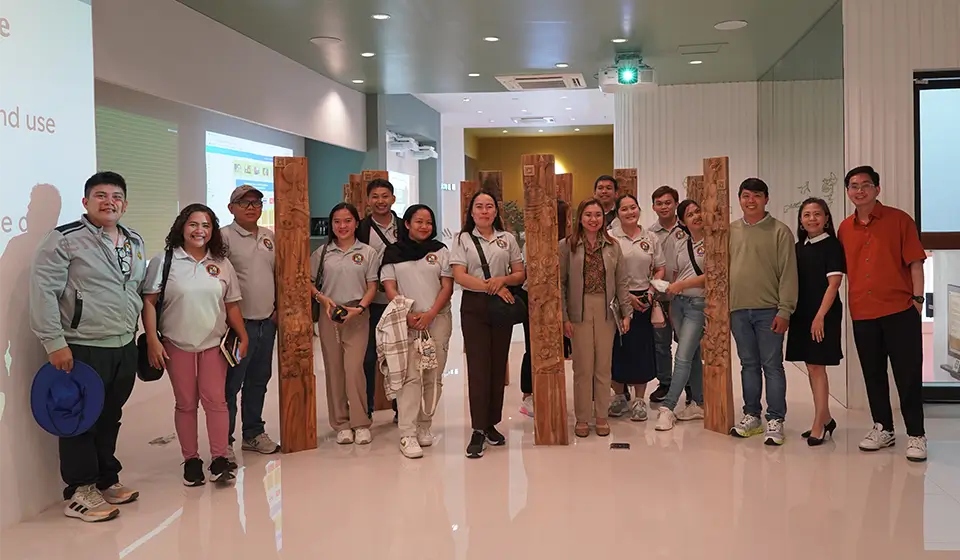
LOS BAÑOS, Philippines—The Southeast Asian Regional Center for Graduate Study and Research in Agriculture (SEARCA) welcomed 12 MS Agricultural Extension students from the University of Southeastern Philippines (USeP), Tagum-Mabini Campus, on 14 November 2025. The visit was part of their educational tour required for their coursework in Extension Research Linkages and Agro-Forestry Enterprise and Management. They were accompanied by Professor Dr. Fernando Magdato.
During the visit, the USeP delegation received an overview of SEARCA's mandates and core programs. This was followed by engaging presentations spotlighting SEARCA's research and extension initiatives.
Ms. Lichelle Dara Carlos, Program Specialist at SEARCA's Emerging Innovation for Growth Department, introduced SEARCA's Grants for Research towards Agricultural Innovative Solutions (GRAINS), which funds innovators with prototypes addressing agricultural challenges. She discussed GRAINS-supported projects, including a hatchery platform for monitoring and managing water quality in shrimp farms, black soldier fly technology for converting organic waste into animal feed, biodegradable bioplastics made from shrimp shells and mango waste, and an agri-financing platform that connects Myanmar farmers with investors. Carlos also presented the ACCELERATOR Program, which provides hands-on support for startup enterprises in the areas of diagnostics, mentorship, market reach, and networking. Partnerships under this initiative include collaborations with enterprises such as ADS, a fruit and vegetable onsite-online platform, and Preksvay Farm, which supports women farmers through vermicompost. Lastly, she introduced the Sustainable Agriculture and Food Security Enhancement Acceleration (SAFE Acceleration) Program, which is designed to aid enterprises that develop regenerative, climate-resilient solutions, helping to scale these innovations and integrate them into business models across Southeast Asia.
Meanwhile, Ms. Anna Gale Vallez, Program Specialist at SEARCA's Research and Thought Leadership Department, elaborated on SEARCA's Research-Extension Linkage Model. This model is a systematic approach for transferring research-based knowledge, technology, and innovations to end-users and the broader community, addressing both developmental and practical agricultural challenges. Vallez detailed how the Center implements the model through four interconnected pillars: research and innovation, capacity development, knowledge management, and policy and program advisory, all of which are supported by strong partnerships. She highlighted several practical applications of the model, including generating evidence for policymaking, conducting training and capacity-building initiatives such as farmer education programs, and providing technical assistance. Notable among these efforts is the development of provincial roadmaps for key commodities, such as calamansi in Oriental Mindoro, Philippines and coconut in Quezon, Philippines. These initiatives, Vallez explained, are designed to bridge the gap between scientific research and actual farming practices, ultimately empowering farmers to adopt innovative approaches that enhance efficiency, productivity, and income.
To cap the visit, the MS students were given a tour of the SEARCA Hub for Agriculture and Rural Innovation for the Next Generation (SHARING) Museum, which showcases interactive exhibits on agriculture and rural development.
SEARCA values such visits as opportunities to foster academic exchange and inspire future leaders in the field of agriculture. By welcoming students and educators, the Center shares its expertise and resources while also building collaborative relationships that can advance agricultural science and innovation throughout Southeast Asia.